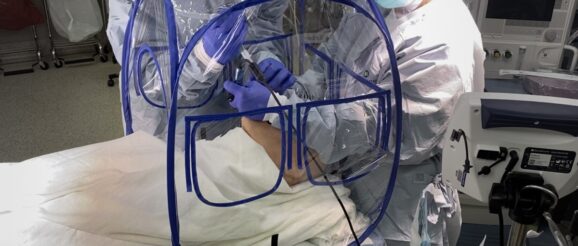Pandemic inspires health-tech innovation as businesses strive for safety

It was early in the coronavirus pandemic when anesthesiologist Dr. Steven Venticinque was intubating a patient and realized that the procedure he had done many times in the past was now something that was putting his health – and possibly his life – at risk.
As he leaned over a patient’s nose and mouth and attempted to force a plastic tube into the patient’s trachea, he was acutely aware that any droplets released during the intubation could leave him infected with the disease he was trying to treat.
“So many [patients] being intubated [have] COVID-19,” Venticinque said.
Venticinque, the chief marketing officer of local medical device startup Olifant Medical, and his co-workers tried to get innovative using PVC pipe, plexiglass, plastic, and tape to create makeshift shields for those types of situations.
What they ultimately developed was a simple single-use lightweight pop-up shield called the STAT Enclosure – a basic structure of wire and plastic that forms a clear box around the patient’s head, forming a protective barrier between doctor and patient. The enclosure is about 22 inches long on each side.
Olifant Medical is one of several San Antonio companies diversifying its business models to keep up with the needs of the changing health environment. Customer safety has become a priority for businesses to succeed, and safety innovation is creating a new revenue stream.
Venticinque is no stranger to taking an existing piece of medical equipment and enhancing it. A year ago, he did something similar when he created the Tusk Tracheal Cannulator, a tool that made inserting an endotracheal breathing tube easier for medical professionals. He developed the prototype on a 3D printer in his garage and used his own money and two grants from UT Health to help bring the product to market.
With the STAT Enclosure, it took Venticinque and his team four iterations to get it ready to market. The product was quickly approved by the Food and Drug Administration via the Emergency Use Authorization track, and it has been adopted in 10 facilities, including all the large hospitals in San Antonio, co-founder Justin Rice said. The shields cost $60 for a pack of 10, he said.
“Some of the other iterations doctors were making needed to be cleaned between patients, which just ups the risk of infection,” Venticinque said. “These can be thrown away after use and are inexpensive, so hospitals can afford them in bulk.”
Venticinque said he and the team at Olifant Medical feel they’ve been given an amazing opportunity to help not only San Antonio’s medical field but the worldwide medical community as well. Olifant’s invention already has been adopted in hospitals in California and France, Rice said.
“We were uniquely positioned to attack this opportunity and we’re happy to help,” Rice said.
In that same vein, Documation, a 30-year-old family-owned business with over 150 employees, has turned its copier and printer business into an innovative technology company with a current focus on pandemic-related solutions.
Its newest device is a contactless thermal scanning kiosk that reads the body temperature of the person standing in front of it. If the user’s temperature indicates a fever, they are flagged, while healthy users are reminded to wear a mask. San Antonio’s Por Vida Academy, the San Antonio Food Bank, and the City of Pleasanton already have adopted the technology as the first line of defense before an infected person enters a building.
“We implemented them in the last month or so at our headquarters and around our different offices, and we saw just the ease and the ability to do that,” Documation Vice President Robby Brown said. “Then we saw that more businesses were doing [manual] temperature checking, but there was a lot of liability and a lot of risks. … So this was really just our way to take a step in the direction of trying to really bring something that can help businesses, organizations, schools … operate safely.”
The kiosks can be purchased as a standalone product or incorporated into a business’s security system.
While coronavirus was Documation’s catalyst for creating this technology, Brown said the company is not “trying to make money off of COVID,” and the company is selling the kiosks “at a very affordable price.” Several machines have been donated to nonprofits, he added.
“We see that this could really benefit the community, and not just the business community but schools and nonprofits, to allow them to operate,” he said.
Alamo Biscuit Co., known for its brunch and biscuit creations, approached safeguarding its patrons and staff at the door by installing a disinfectant-spraying mist portal that customers can walk through before entering the dining room.
The portal is an archway with a button customers can press if they want to be sprayed with hypochlorous acid — a weak disinfectant formed when chlorine dissolves in water. The chemical, which won’t irritate skin or eyes and isn’t harmful if ingested, can oxidize bacteria in seconds, and it’s said to be 70-80 times more efficient at killing microbial pathogens than chlorine bleach.
Alamo Biscuit Co. owner John Vale has created a cleaning supplies company to help meet the demand for disinfecting products.
“I have another company called Sanitizer2You that I started earlier this year in March,” he said. It was while doing his research for this new company that he came across the portal design in Mexico, Vale said.
He decided to bring the portal to the U.S. hoping to add “another level of security” for his customers and employees.
“We already put out hand sanitizer, so I figured why not put out a portal, too, to spray down the whole body and not just the hands.” Vale said. “Customers can use it as they’re coming out or going in, and employees will even do it while working between tables sometimes.”
